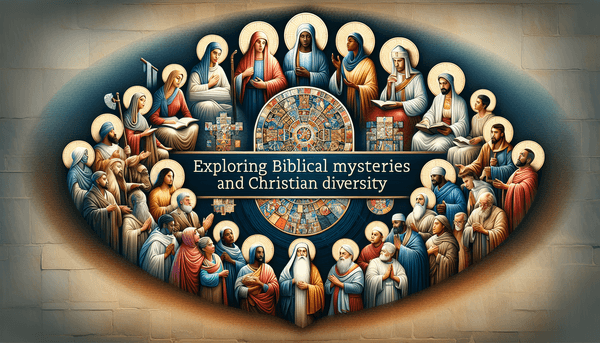The Mystery of God's Creation and Existence
The mystery of God's creation and existence is beyond our full comprehension. Ecclesiastes 11:5 acknowledges, 'As you do not know the path of the wind, or how the body is formed in a mother’s womb, so you cannot understand the work of God, the Maker of all things.' His ways are indeed 'higher than our ways and His thoughts than our thoughts' (Isaiah 55:8-9). Yet, in this mystery, we find a call to trust in the eternal God (Psalm 90:2) who orchestrates the universe with wisdom and might, and to live with humility under His sovereign care. As we marvel at the intricacies of His creation and His grand design for life, we can also explore how to navigate life's complexities through faith as discussed in lessons from John 9 and the wisdom of Proverbs.
Jesus—His Names and Sacrifice
The names and titles of Jesus throughout the Bible reflect His multifaceted role and the depth of His sacrifice. As 'the Lamb of God, who takes away the sin of the world' (John 1:29), Jesus' offering on the cross is the epitome of a living sacrifice, which we are called to emulate in our own lives (Romans 12:1). Isaiah foretold His coming, naming Him 'Wonderful Counselor, Mighty God, Everlasting Father, Prince of Peace' (Isaiah 9:6), and in Revelation, He is declared to be the 'Alpha and Omega' (Revelation 22:13), illustrating His eternal significance. We honor Jesus by acknowledging His presence and role in our lives, as we step into the spaces created for worship and reflection on His love and redemption.
Lent and Spiritual Growth for All
Lent is a season that extends an invitation to all—believers and non-believers alike—to engage in self-discipline, reflection, and spiritual growth. This period, observed by various Christian denominations, is marked by practices that mirror Jesus' own journey into the desert (Matthew 4:1-11). It is a time for introspection, as individuals seek to align their lives more closely with God's will (2 Corinthians 5:20-21). Whether through fasting, prayer, or acts of service, Lent encourages a deeper commitment to faith, and a heartfelt return to God (Joel 2:12-13), acknowledging that our practices of observance are a personal response to His call (Romans 14:5-6).
Conclusion
As we conclude, we are reminded that the threads of conversation within the Bible offer a vast reservoir of wisdom, addressing the deepest cries of the heart and the earnest pursuit of understanding. Through exploring themes of redemption, divine love, the awe of creation, the profound nature of Jesus, and the reflective season of Lent, we have glimpsed the multifaceted wisdom of Scripture. In this journey, finding mental healing and spiritual wholeness is also a testament to the Bible's enduring relevance. Let these truths be a constant guide, leading us to the light of understanding and the hope of eternal life, as we carry with us the assurance of God's promises, the comfort of His love, and the challenge to deepen our faith in meaningful ways.
FAQ
Q: Can you explain Joshua 21 in simple terms?
A: Certainly! Joshua 21 describes the cities given to the Levites, the priestly tribe of Israel who had no land of their own for farming. Instead, they were given cities to live in and work for the temple service. These cities were provided by the other Israelite tribes as a gift from God, demonstrating His provision for His servants and His faithfulness to His promises.
Q: What does the Father think of humans?
A: The Father views us with immense love and compassion. In the Bible, 1 John 3:1 says, 'See what great love the Father has lavished on us, that we should be called children of God! And that is what we are!' This verse illustrates the depth of God's love for us and the incredible privilege of being called His children.
Q: What are the names and significance of Jesus' sacrifice?
A: Jesus is known by many names in the Bible, each reflecting a different aspect of His character and mission. For example, He is called the 'Lamb of God' (John 1:29), indicating His role as the sacrificial offering for our sins. His sacrifice is significant because it provides redemption and sets us free from the curse of the law (Galatians 3:13).
Q: What is the purpose of Lent?
A: Lent is a season of 40 days leading up to Easter, marked by fasting, prayer, and penitence. It serves as a time for Christians to reflect on Jesus' sacrifice, engage in self-examination, and prepare their hearts for the celebration of His resurrection. It is a period for spiritual growth and drawing closer to God (Matthew 4:1-11).





